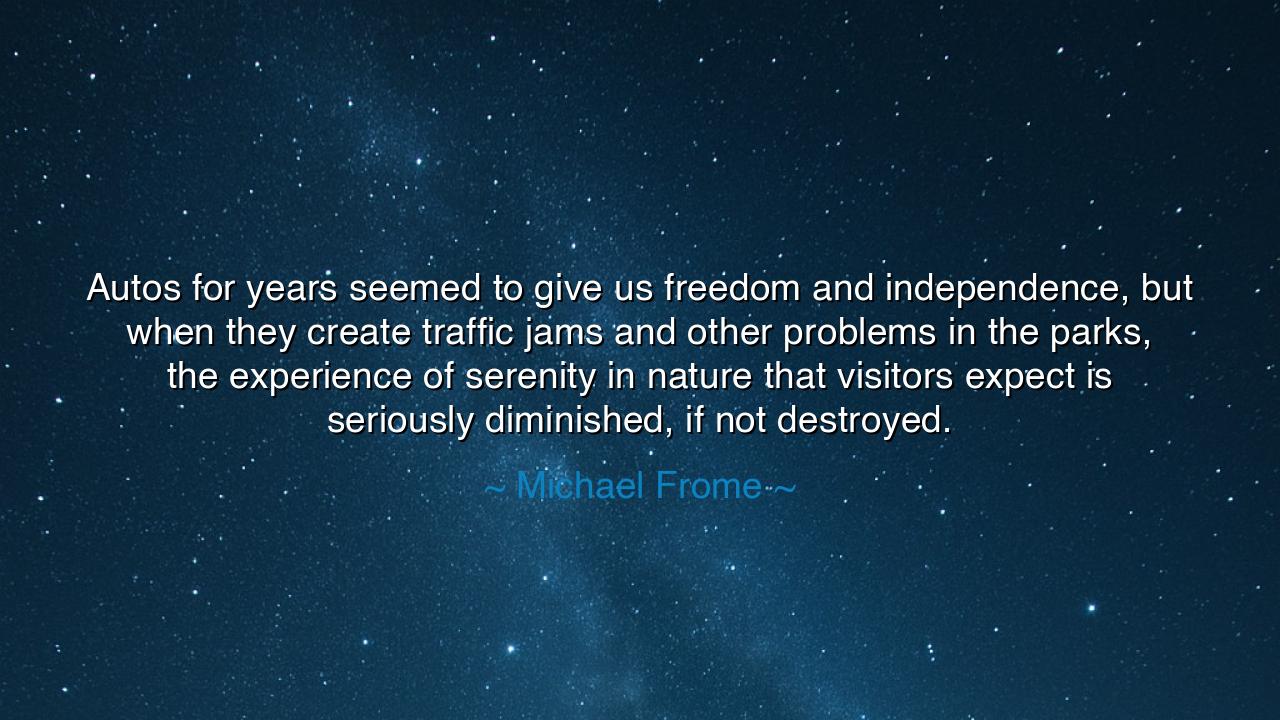
Autos for years seemed to give us freedom and independence, but
Autos for years seemed to give us freedom and independence, but when they create traffic jams and other problems in the parks, the experience of serenity in nature that visitors expect is seriously diminished, if not destroyed.






The words of Michael Frome, a guardian of the American wilderness and a prophet of conservation, speak with both reverence and warning. When he said, “Autos for years seemed to give us freedom and independence, but when they create traffic jams and other problems in the parks, the experience of serenity in nature that visitors expect is seriously diminished, if not destroyed,” he was not simply lamenting the presence of cars in the forests—he was naming the contradiction of modern civilization. His words are the cry of one who saw how humanity, in its hunger for freedom, had begun to imprison itself. What was once a symbol of liberation had become a source of confinement; what was meant to carry us toward beauty had begun to suffocate it.
To understand his meaning, we must recall the age from which he spoke. In the mid-twentieth century, as highways spread like veins across the American continent, the automobile came to represent the pinnacle of personal independence. People could now drive through deserts, mountains, and valleys, reaching the once-remote sanctuaries of nature. The national parks, those sacred lands preserved for the soul of the nation, opened their gates wide to millions. Yet as the tide of cars rose, so too did their burdens—noise, fumes, congestion, and the slow erosion of stillness. Frome, a journalist and environmentalist, watched as the pursuit of freedom through machines began to destroy the very freedom found in silence and simplicity.
He saw a deeper tragedy in this: the way in which progress, untempered by wisdom, can consume its own purpose. The automobile, like many of humankind’s inventions, was born from noble intent—the desire to move, to explore, to escape the boundaries of time and place. But unchecked, that same invention became a chain. When thousands of cars clog the narrow roads of Yosemite or Yellowstone, when the air hums with engines instead of birdsong, when the scent of pine is masked by exhaust, something essential is lost. Nature, once a sanctuary, becomes another backdrop for our restlessness. Frome’s warning is not against cars themselves, but against the spirit that forgets the balance between freedom and restraint.
There is a story that echoes his message. In the 1960s, the government of the United States faced a dilemma in Yellowstone National Park. The number of visitors had soared, and with them, an endless stream of automobiles. Traffic crawled through valleys once untouched by man’s haste; animals fled from the roar of engines; litter and fumes marred the land. The solution came from a simple return to humility—restrictions on vehicles, shuttles for transport, and paths for walking. Those who slowed their pace found that the park regained its peace. It was a living lesson in Frome’s truth: freedom is not found in speed, but in presence; not in conquering nature, but in listening to it.
In the voice of the ancients, we may say: every gift of progress carries the shadow of its excess. The fire that warms the hearth can also consume the forest. The plow that feeds the people can also strip the soil. The car that grants us independence can also enslave us to motion without meaning. Michael Frome spoke for a time when man needed to remember the sacred rhythm of nature—to walk instead of race, to listen instead of conquer. He understood that independence without harmony becomes isolation, and that the measure of a people’s wisdom lies in how gently they tread upon the earth.
Yet, his message stretches far beyond parks and roads. It speaks to our age, where every convenience threatens to eclipse contentment. We are surrounded by devices that promise freedom and connection, yet often they distract and divide. Just as cars crowded the valleys, so too our minds are crowded by constant noise. Frome’s warning, if heard anew, calls us to rediscover serenity—not only in the wilderness, but within ourselves. We must learn again that to experience the world fully, we must first learn to be still.
The lesson, then, is this: true freedom is not the ability to go anywhere, but the ability to be at peace wherever you are. Nature offers this wisdom endlessly, yet it will not shout—it will whisper, and only those who slow down will hear it. Protect the stillness of the natural world as you would protect your own soul, for they are one and the same. The destruction of nature’s serenity is the destruction of our own.
And so, the practical path is clear: when you enter the forest, leave behind the roar of engines and the rush of the clock. Walk softly, breathe deeply, listen to the wind. Support the preservation of parks, reduce your footprint, and remember that the truest form of independence lies not in domination over the earth, but in communion with it. For as Michael Frome reminds us, the miracle of nature’s serenity is not something we can drive to—it is something we must arrive at, quietly, humbly, and with reverence.






AAdministratorAdministrator
Welcome, honored guests. Please leave a comment, we will respond soon